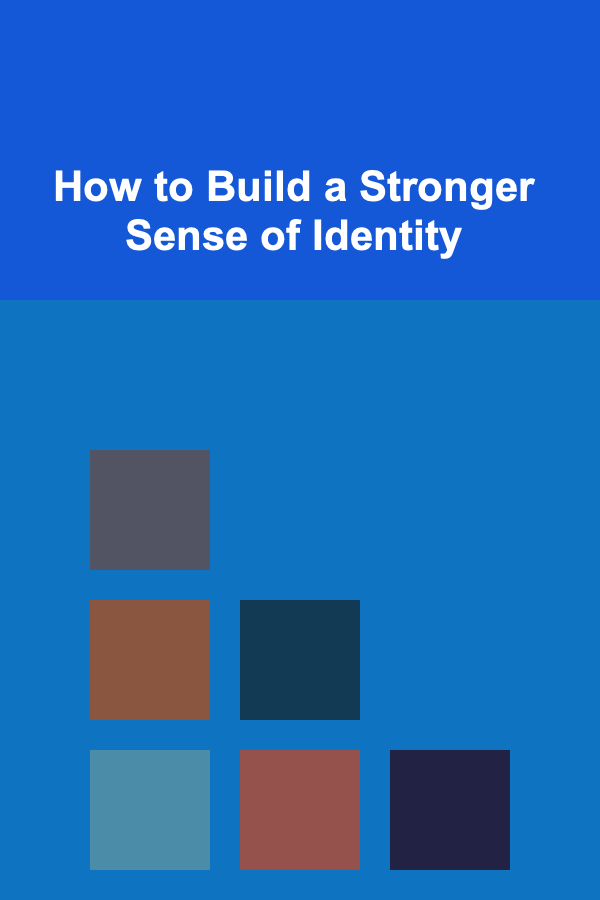
How to Build a Stronger Sense of Identity
ebook include PDF & Audio bundle (Micro Guide)
$12.99$6.99
Limited Time Offer! Order within the next:

A strong sense of identity is one of the most powerful assets a person can have. It anchors us to who we are and gives us clarity in how we navigate life's challenges, relationships, and decisions. But, in today's rapidly changing world, cultivating a sense of self can be difficult. We are constantly bombarded with external influences that shape and sometimes distort how we see ourselves. Whether through social media, societal expectations, or personal insecurities, we can lose touch with our true selves.
In this article, we will explore ways to build and strengthen your sense of identity. The process of self-discovery and self-empowerment isn't instantaneous---it's a continuous journey of understanding, acceptance, and growth. The key lies in learning to identify your values, passions, and the narrative that drives your life. Here's how you can start.
Understand the Role of Self-Identity
Self-identity, or the sense of who you are, is formed by the experiences, beliefs, and values that make up your life. It's the combination of how you see yourself and how others see you. A well-formed identity is grounded in a clear sense of who you are, what you stand for, and what you want to achieve.
Why is Identity Important?
Having a strong identity serves several important functions:
- Direction and Purpose: It helps guide your choices and actions in life. When you know who you are and what you believe in, you have clarity about your goals and priorities.
- Emotional Resilience: A stable sense of self can help you weather emotional challenges. It gives you the internal strength to face adversity with confidence.
- Connection and Belonging: A strong identity allows you to form authentic connections with others. When you are comfortable with who you are, you can build meaningful relationships.
But, when our self-identity is fragile or confused, we may struggle with indecision, low self-esteem, and a sense of detachment from our true selves.
Explore Your Core Values
One of the first steps in building a stronger sense of identity is identifying your core values. These are the beliefs and principles that guide your behavior, decisions, and interactions with others. Your values represent what is most important to you and often inform your long-term goals and priorities.
How to Identify Your Values
- Reflect on Past Decisions: Look at past decisions you've made, both good and bad. What motivated those decisions? Was it your desire for success, compassion, fairness, freedom, or something else? Reflecting on these moments can help you pinpoint your core values.
- Consider Your Role Models: Think about people you admire---whether they are family members, public figures, or fictional characters. What qualities do they embody that resonate with you? These qualities may reflect the values you cherish.
- Assess Your Emotional Responses: Pay attention to how you feel when certain values are honored or violated. For example, when you see injustice or unfairness, do you feel anger or a sense of responsibility to act?
Once you identify your values, write them down. Keep them somewhere visible to remind yourself of what you stand for. When faced with a tough decision, ask yourself, "Which of my values does this align with?" This process will help you make choices that are in harmony with who you are.
Engage in Self-Reflection
Self-reflection is an essential practice for building a stronger sense of identity. It allows you to pause, look inward, and assess where you are in your life. Through reflection, you can gain a deeper understanding of your motivations, thoughts, and behaviors.
Benefits of Self-Reflection
- Clarity: It helps you gain a clearer understanding of your goals, desires, and emotional states. It allows you to see patterns in your behavior and make adjustments if necessary.
- Self-Awareness: The more you reflect on your experiences, the better you can recognize the thoughts and emotions that influence your actions. Self-awareness is key to personal growth and development.
- Alignment: Regular reflection helps you ensure that your actions are aligned with your values and long-term goals. It prevents you from straying off course or getting caught up in distractions.
How to Practice Self-Reflection
- Journaling: Write down your thoughts, feelings, and experiences daily or weekly. Reflect on what went well, what didn't, and how you can improve. Journaling helps you process your emotions and track your growth.
- Mindfulness: Practicing mindfulness through meditation or simply being present in the moment can enhance your self-awareness. Mindfulness allows you to observe your thoughts and feelings without judgment, which helps you better understand your identity.
- Ask Yourself Key Questions: Regularly ask yourself questions such as: "What are my strengths and weaknesses?", "What do I want to achieve?", and "Am I living in alignment with my values?". These questions can help you gain insight into who you are and where you're headed.
Embrace Your Authentic Self
In a world full of expectations and societal pressures, it can be tempting to wear a mask or conform to fit in. However, true fulfillment comes from embracing your authentic self. When you accept and express your true identity, you build confidence and a sense of inner peace.
Why Authenticity is Important
- Self-Acceptance: Embracing your authentic self helps you accept your flaws, imperfections, and uniqueness. This acceptance fosters a positive self-image and reduces the need for external validation.
- Increased Confidence: When you stop pretending to be someone you're not, you gain the confidence to pursue your passions and make decisions that reflect your true values.
- Stronger Connections: Authenticity fosters deep, meaningful connections with others. When you are genuine, you attract people who resonate with your true self, rather than the version of you that is shaped by external expectations.
How to Embrace Your Authentic Self
- Stop Comparing Yourself to Others: Social comparison is a trap that leads to insecurity and self-doubt. Focus on your own journey and stop measuring yourself against others' accomplishments or lifestyles.
- Let Go of Perfectionism: Perfectionism creates a false sense of self. Accept that you don't need to be perfect to be worthy of love and respect. Embrace your flaws as part of who you are.
- Honor Your Needs and Desires: Take time to identify your true needs and desires, and then take steps to honor them. This might involve saying no to things that don't serve you or setting boundaries with others.
Challenge Limiting Beliefs
Many of us have internalized limiting beliefs that hold us back from fully embracing who we are. These beliefs may be rooted in past experiences, societal conditioning, or self-doubt. They can prevent us from living authentically and achieving our potential.
Common Limiting Beliefs
- "I'm not good enough.": This belief often stems from childhood experiences or societal standards that make us feel inadequate.
- "I don't deserve success.": Some people struggle with feelings of guilt or undesirability, leading them to sabotage their own progress.
- "I have to be perfect to be accepted.": The belief that we must be flawless in order to be loved or valued can prevent us from embracing our true selves.
How to Challenge Limiting Beliefs
- Identify the Source: Pinpoint where these beliefs came from. Are they based on past failures, societal pressure, or negative experiences? Recognizing the origin of the belief can help you separate it from your true self.
- Reframe Negative Thoughts: When you catch yourself thinking a limiting thought, reframe it with a more empowering belief. For example, instead of thinking, "I'm not good enough," reframe it as, "I am capable of growth and learning."
- Take Small Steps Toward Change: Start by taking small actions that contradict your limiting beliefs. If you believe you're not good enough, challenge that by setting and achieving small goals that reinforce your sense of capability.
Cultivate Personal Growth
A strong sense of identity isn't static---it evolves over time. Personal growth involves continuously learning, adapting, and evolving to become the best version of yourself. To build a stronger identity, commit to lifelong growth and self-improvement.
How to Cultivate Personal Growth
- Set Meaningful Goals: Define what you want to achieve in life and set clear, actionable goals. Goals provide direction and motivate you to work towards becoming your best self.
- Learn Continuously: Embrace a mindset of lifelong learning. Read books, attend workshops, and seek new experiences that challenge your current perspective and expand your knowledge.
- Embrace Challenges: Growth happens outside of your comfort zone. Embrace challenges and setbacks as opportunities for growth. Each challenge you face is a chance to learn and strengthen your sense of self.
Surround Yourself with Positive Influences
The people you surround yourself with play a significant role in shaping your identity. Positive influences can uplift and support you in your journey to self-discovery, while negative influences can drain your energy and hinder your growth.
How to Build a Positive Support Network
- Find Like-Minded People: Seek out people who share your values and passions. Surround yourself with those who inspire and encourage you to be the best version of yourself.
- Set Boundaries with Toxic Individuals: Learn to recognize toxic relationships that drain your energy or reinforce negative beliefs. Set healthy boundaries with these individuals and, if necessary, distance yourself from them.
- Seek Mentorship: Find a mentor who can guide and support you in your journey. A mentor can offer valuable insights, advice, and encouragement as you navigate your personal growth.
Celebrate Your Progress
Finally, remember to celebrate your progress, no matter how small. Building a strong sense of identity is an ongoing process, and each step forward is a victory. By acknowledging your progress, you reinforce your commitment to your personal growth and strengthen your sense of self.
How to Celebrate Your Progress
- Track Your Achievements: Keep a record of the goals you've achieved and the lessons you've learned. Reflect on how far you've come and take pride in your progress.
- Reward Yourself: Give yourself small rewards for milestones you've reached. This could be anything from taking a day off to treating yourself to something you enjoy.
- Practice Gratitude: Take time each day to reflect on what you're grateful for. Gratitude fosters a positive mindset and helps you appreciate the journey you're on.
Building a stronger sense of identity is a lifelong endeavor. By understanding your core values, reflecting on your experiences, embracing authenticity, challenging limiting beliefs, and committing to personal growth, you can create a clear and confident sense of self. Ultimately, the process of self-discovery and self-empowerment is about living in alignment with who you truly are, and confidently navigating the world on your own terms.

How to Choose the Right Bulb for Different Lighting Needs in Your Home
Read More
How to Organize a Moving Party: Fun and Productive!
Read More
What Should You Know About Creating an Organized Meal Prep Area?
Read More
Why A Well-Organized Kitchen Can Inspire Culinary Creativity
Read More
How To Build a Community Bird Garden
Read More
Finding Challenging Hiking Trails: A Comprehensive Guide
Read MoreOther Products

How to Choose the Right Bulb for Different Lighting Needs in Your Home
Read More
How to Organize a Moving Party: Fun and Productive!
Read More
What Should You Know About Creating an Organized Meal Prep Area?
Read More
Why A Well-Organized Kitchen Can Inspire Culinary Creativity
Read More
How To Build a Community Bird Garden
Read More